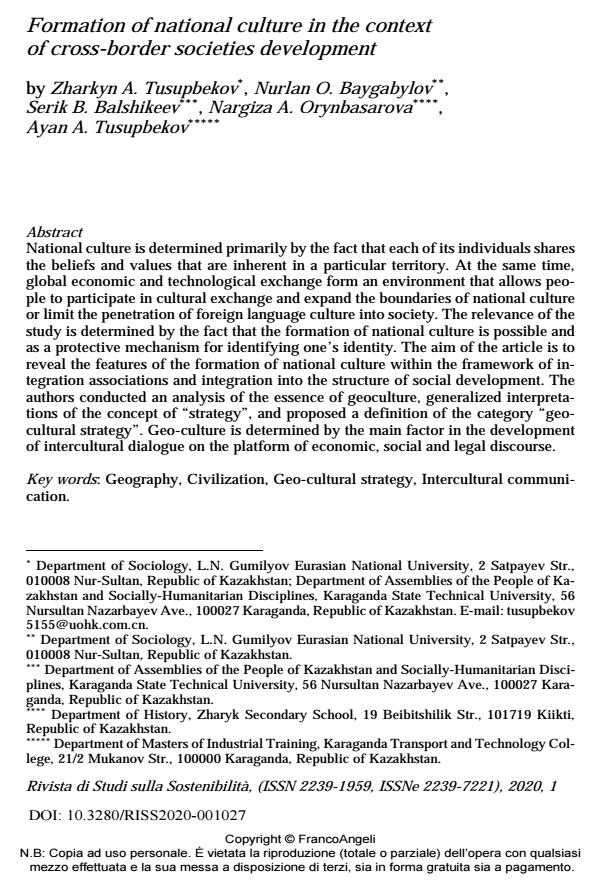Formation of national culture in the context of cross-border societies development
Titolo Rivista RIVISTA DI STUDI SULLA SOSTENIBILITA'
Autori/Curatori Zharkyn A. Tusupbekov, Nurlan O. Baygabylov, Serik B. Balshikeev, Nargiza A. Orynbasarova, Ayan A. Tusupbekov
Anno di pubblicazione 2020 Fascicolo 2020/1 Lingua Inglese
Numero pagine 20 P. 459-478 Dimensione file 140 KB
DOI 10.3280/RISS2020-001027
Il DOI è il codice a barre della proprietà intellettuale: per saperne di più
clicca qui
Qui sotto puoi vedere in anteprima la prima pagina di questo articolo.
Se questo articolo ti interessa, lo puoi acquistare (e scaricare in formato pdf) seguendo le facili indicazioni per acquistare il download credit. Acquista Download Credits per scaricare questo Articolo in formato PDF

FrancoAngeli è membro della Publishers International Linking Association, Inc (PILA)associazione indipendente e non profit per facilitare (attraverso i servizi tecnologici implementati da CrossRef.org) l’accesso degli studiosi ai contenuti digitali nelle pubblicazioni professionali e scientifiche
National culture is determined primarily by the fact that each of its individuals shares the beliefs and values that are inherent in a particular territory. At the same time, global economic and technological exchange form an environment that al-lows people to participate in cultural exchange and expand the boundaries of national culture or limit the penetration of foreign language culture into society. The relevance of the study is determined by the fact that the formation of national cul-ture is possible and as a protective mechanism for identifying one’s identity. The aim of the article is to reveal the features of the formation of national culture with-in the framework of integration associations and integration into the structure of social development. The authors conducted an analysis of the essence of geocul-ture, generalized interpretations of the concept of "strategy", and proposed a defi-nition of the category "geocultural strategy". Geo-culture is determined by the main factor in the development of intercultural dialogue on the platform of economic, social and legal discourse.
Keywords:Geography, Civilization, Geocultural strategy, Intercultural communication.
- Alguliev R., Mahmudova R. (2011). Structural approach to the formation of information culture of individuals. In: Abd Manaf A., Sahibuddin S., Ahmad R., Mohd Daud S., El-Qawasmeh E. (eds.). Informatics Engineering and Information Science. Heidelberg, Berlin.
- Baughn C.C., Neupert K.E. (2003). Culture and national conditions facilitating entrepreneurial start-ups. Journal of International Entrepreneurship, 1(3): 313-330.
- Brown R.H. (1996). Cultural representation and state formation: discourses of ethnicity, nationality, and political community. Dialectical Anthropology, 21(3): 265-297. DOI: 10.1007/BF00245770
- Coombs J., Alston Y.R. (1989). Companies and organizations: products and areas of research. In: The International Biotechnology Directory 1990: Products, Companies, Research and Organizations. Palgrave Macmillan, London. DOI: 10.1007/978-1-349-11000-1_3
- Dahl V. (2016). Explanatory dictionary of the Russian language. Harvest, Moscow.
- Dheer R.J.S. (2017). Cross-national differences in entrepreneurial activity: role of culture and institutional factors. Small Business Economics, 48(4): 813-842.
- Dzhalladova І., Batechko N.; Gladka Y. (2020). System approach to the formation of the information culture levels in cyberspace. In: Antipova T., Rocha Á. (eds.). Digital Science 2019. Springer International Publishing, Cham.
- Fritsch M., Kublina S. (2019). Persistence and change of regional new business formation in the national league table. Journal of Evolutionary Economics, 29(3): 891-917.
- He C. (2012). Field-specific modernization, in Modernization Science: The Principles and Methods of National Advancement. Springer, Berlin, Heidelberg. DOI: 10.1007/978-3-642-25459-8_6
- Korostelina K.V. (2007). Formation of national identity and conflict intentions of minorities. In: Social Identity and Conflict: Structures, Dynamics, and Implications. Palgrave Macmillan, New York. DOI: 10.1057/9780230605671_9
- Korostelina K.V. (2013a). Nation building and national identity formation. In: History Education in the Formation of Social Identity: Toward a Culture of Peace. Palgrave Macmillan, New York. DOI: 10.1057/9781137374769_7
- Korostelina K.V. (2013b). Identity-based approach to the formation of peace culture in history education. In: History Education in the Formation of Social Identity: Toward a Culture of Peace. Palgrave Macmillan, New York. DOI: 10.1057/9781137374769_2
- Koukoutsaki-Monnier A. (2015). Understanding national identity: between culture and institutions. American Journal of Cultural Sociology, 3(1): 65-88.
- Lawson S. (2006). History, culture and the national state. In: Culture and Context in World Politics. Palgrave Macmillan, London. DOI: 10.1057/9780230625730_6
- Lepsius M.R. (2017). The formation of the german political culture by institutional orders. In: Wendt C. (ed.). Max Weber and Institutional Theory. Springer International Publishing, New York. DOI: 10.1007/978-3-319-44708-7_13
- Maltseva O. (2014). Laughter as a factor in the development of national socio-cultural identity of Ukrainian Cossacks. Skhid, 5(131): 107-116. DOI. 10.21847/1728-9343.2014.5(131).29625.
- Nakata C., Sivakumar K. (2001). Instituting the marketing concept in a multinational setting: the role of national culture. Journal of the Academy of Marketing Science, 29(3): 255-259. DOI: 10.1177/03079459994623
- Nicolaidis C., Millar C. (1997). National culture, corporate culture and economic performance: an interdisciplinary synthesis and implications for internationalisation strategy. In: Chryssochoidis G., Millar C., Clegg J. (eds.). Internationalisation Strategies. Palgrave Macmillan, London. DOI: 10.1007/978-1-349-25353-1_6
- Ouyang K. (2017). Connotation, characteristics and functions of national spirit. In: The Chinese National Spirit: The Core of a Spiritual Home. Springer, Singapore. DOI: 10.1007/978-981-10-3915-7_3
- Roberts B. (1999). Time, biography and ethnic and national identity formation. In: Brehony K.J., Rassool N. (eds.). Nationalisms Old and New. Palgrave Macmillan, London. DOI: 10.1007/978-1-349-27627-1_10
- Rudenko M.N. (2018). Mechanisms for development and realization of economic capacity of the regional population from the perspective of sociocultural approach. Journal of Advanced Research in Law and Economics, 9(2): 645-663.
- Treaty on European Union (1992). -- Available from: https://europa.eu/europeanunion/sites/europaeu/files/docs/body/treaty_on_european_union_en.pdf.
- Villegas C.M. (2019). The middle class as a culture structure: rethinking middle-class formation and democracy through the civil sphere. American Journal of Cultural Sociology, 7(2): 135-173.
- Welch S. (1993). Political culture and national identity. In: The Concept of Political Culture. Palgrave Macmillan, London. DOI: 10.1007/978-1-349-22793-8_8
- Methodological limitations of sociocultural studies of law Sergey Borisovich Zinkovsky, G.I. Muromtsev, S.B. Zinkovskii, in SHS Web of Conferences /2021 pp.01008
DOI: 10.1051/shsconf/202111801008
Zharkyn A. Tusupbekov, Nurlan O. Baygabylov, Serik B. Balshikeev, Nargiza A. Orynbasarova, Ayan A. Tusupbekov, Formation of national culture in the context of cross-border societies development in "RIVISTA DI STUDI SULLA SOSTENIBILITA'" 1/2020, pp 459-478, DOI: 10.3280/RISS2020-001027